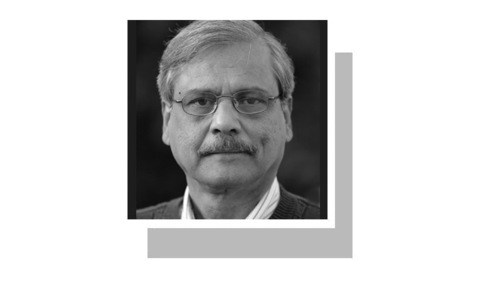THOUGH the recent tiff between Maulana Fazlur Rehman and his PDM ally, the ruling PML-N, seems to have largely subsided after the latter explained its position, political pundits believe that the cracks, which have been papered over for now, may widen in the future.
With elections seemingly on the horizon in the next few months, politicking has already reached fever pitch.
The Pakistan Peoples Party, who were a part of the ruling coalition, fired the first salvos when it put pressure on the federal government to enhance budgetary allocations for Sindh, and got their way.
Now, it appears, is the JUI-F’s turn to flex its muscle. At stake is the position of the party chief in the post-poll scenario and their share in the future Khyber Pakhtunkhwa and Balochistan governments.
Insiders suggest PML-N’s forays into KP electoral politics raised hackles in JUI-F
The JUI camp thinks that the underlying factors, which led Maulana Fazl to go public with his concerns, would not only persist, but grow as major parties reconsider their strategies for pre- and post-poll scenarios.
The huddle held in Dubai on June 27 between PML-N supremo Nawaz Sharif, his daughter Maryam Nawaz, PPP leader Asif Ali Zardari and party chairman Bilawal Bhutto-Zardari has obviously touched a raw nerve with the Maulana.
But he had kept quiet for the next 12 days and reacted only on July 9, when news about a supposed consensus on the caretaker set-up, election dates and post-poll arrangements made headlines.
The Maulana wondered how he, as the head of PDM, could be kept out of the loop on the “planned meeting, its agenda and even decisions” reached between the two parties — one of which is a component of PDM and the other an ally.
Following his public outburst, the PML-N swung into action and tasked Interior Minister Rana Sanaullah Khan to “explain the situation to the Maulana to soothe his nerves”.
Mr Sanaullah swore there was no decision taken on “the date of elections, caretaker set-up or any other political issues”.
In fact, “there was nothing to explain. It was just a routine meeting,” he told television channels regarding the Dubai huddle. Prime Minister Shehbaz Sharif then invited the Maulana to his office on Monday and tried to pacify him further.
Finally, Nawaz Sharif invited the JUI-F chief and changed his travel plans to stop in Dubai on his way to London from Saudi Arabia.
‘Nothing serious’
Despite accepting the PML-N’s arguments, the JUI-F still thinks that it is a naïve explanation.
“After all, the [Dubai] meeting was a planned one. Nawaz Sharif travelled from UK, Maryam Nawaz flew from Pakistan, Asif Ali Zardari jetted off from Pakistan and Bilawal spared time for it,” says Aslam Ghauri, spokesman for JUI-F, while talking to Dawn.
“Those who attended were not there by chance; they went with a purpose [to attend a meeting]. Was it without any agenda?” he wondered.
The party, he says, accepted the PML-N’s explanation also because it believes that the entire thing was blown out of proportion in the first place.
What the Maulana had said was more of a procedural political matter — like how can the head of an alliance be kept out of negotiations between a component and an allied party — and promised to ask for an explanation, the spokesman added.
Javed Latif of PML-N seconded Mr Ghauri’s viewpoint when he told Dawn that everything is back to normal between both the parties.
“It was just a misunderstanding, which has been removed. Neither the Dubai meeting was planned nor was any decision taken. All those leaders just happened to be there and met. Nothing more!”
Zahid Hussain, a noted journalist, thinks on the same lines. “There was nothing serious in the Maulana’s outburst: it was rather an attempt to make his presence felt and get a few favours here and there, which is part of the JUI-F’s politics and governance of alliance.
Once he got it, dust settled. However, things may heat up once assemblies are dissolved and electoral lines are drawn.“
Electoral context
PML-N insiders, however, think that the Maulana’s remarks have an electoral context as well.
“For the last two years, the party had largely left the KP province to the JUI-F leadership.
It was content with playing a subservient role. But, recently, the party engaged two organisations for an electoral survey in the province. Both surveys indicated that JUI-F is losing its sheen due to the caretakers’ performance, which the party virtually did — at least in public perception,“ a source privy to discussions in London told Dawn.
This, he claims, forced the PML-N to reconsider its position and strategy.
“The party started contacting and encouraging electables and accepted some (like Shahjee Gul Afridi from Khyber along with three MPAs) — something, which it had avoided so far. Naturally, it raised the JUI-F’s eyebrows. The current reaction of JUI-F also includes its response to the change in the PML-N strategy,” the source said.
Mr Ghauri, however, disagrees, saying that his party is neither aware of any surveys nor of any change in the PML-N strategy.
“The PML-N is an independent party and has every right to opt for electables or any candidates of its choice. The JUI-F has recently proven its strength in the local bodies’ election, which it won,” he pointed out.
Hassan Askri Rizvi, a political analyst and former caretaker chief minister, counts the JUI-F’s fears when he says Maulana Fazl has reasons to be suspicious about meetings like the one held in Dubai.
“He [Fazl] has tasted power in KP now and thinks that PTI’s fall would further cement his hold. Anything disturbing his calculations disturbs him, and both PPP and PML-N did precisely that. Once electoral politics gathers momentum, the JUI-F and its chief might have troubling nights in days to come.”
Published in Dawn, July 13th, 2023













































